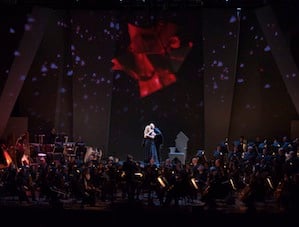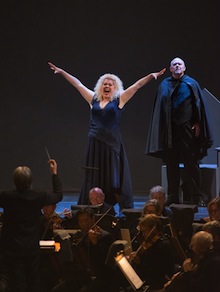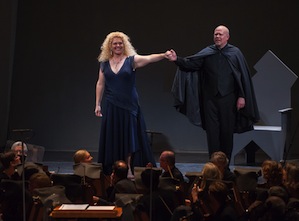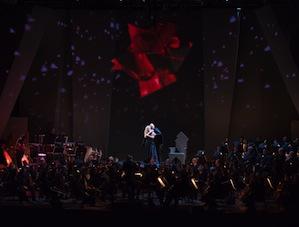
Photos by Kristen Loken
Leading up to the dark, powerful drama of Béla Bartók's Duke Bluebeard's Castle, the San Francisco Symphony's "Hungarian night" in Davies Symphony Hall began with the sweetness-and-light Liszt Piano Concerto No. 1, a curious filler to the 55-minute one-act opera.
It went well enough, with Jeremy Denk as the soloist and Michael Tilson Thomas giving the bravura piece an unusually relaxed, lyrical reading. The concerto is only 20 minutes long, and apparently its brevity so surprised the audience that for the first time in months, there was no standing ovation for a concerto — not in response for anything wrong, just going back to normalcy.
And then came a true, wonderful highlight of the orchestra's centennial season, a great performance of a century-old masterpiece from a 30-year-old composer, whose music sounds as contemporary today as it did back in 1912.

Episodes of a new bride (Judith, sung by mezzo Michelle DeYoung) exploring both the mysterious Bluebeard (bass-baritone Alan Held) and his castle are accompanied by music ranging from raging outbursts to achingly beautiful passages. Through it all, MTT and the orchestra were exceptional, especially the enlarged brass section. DeYoung shone vocally and dramatically, Held did his best, but lacked the power and majesty of such storied performers of the role as Mihály Székely.
Still challenging to ears not accustomed to dissonance, or to a uniquely Hungarian version of parlando-sprechstimme, or to prominent use of minor seconds, Bluebeard can nevertheless sweep away a new listener. To veterans of this music, there isn't an iota of surfeit, such as experienced with the Liszt concerto. This is magnificent, evergreen, herculean, unforgettable music.
At the core: an utterly suspenseful, gripping psychological drama, adapted from a French fairy tale by Charles Perrault (no Cinderella this), with a poetic libretto by Béla Balázs — a poor translation projected above the stage, the original text sung fairly well by DeYoung and incomprehensibly by Held.
An ever-present problem with the work is what to do with its spoken prologue, simply untranslatable, and rather long. In the SFS treatment, the famed veteran actor Ken Ruta spoke an abbreviated approximation of the original.

This is a fine semistaged production by Richard Slaney, with Adam Wiltshire's large but simple sets, directed by Nick Hillel and staged by Jose Maria Condemi.
As the fatal inward journey goes from the castle's torture chamber, to the armory, the treasury, the garden, a view of Bluebeard's kingdom (with one of the most majestic outbursts in all music), the pool of tears, and to the shocking discovery of what's beyond the final door, the physical production illustrated the scenes without interfering with the opera too much — with one exception.
As the fifth door is opened, to Bluebeard's immense domain, Judith — overwhelmed — utters a sudden loud cry of surprise, the orchestra storms... and all stagelights are turned on the audience, flooding the hall, blinding the listeners. The intention of making us share Judith's experience physically is good, the actual shtick is awful: it interferes with the music instead of enhancing it. (What next: aroma-rama for the garden scene?)
And yet, nothing really matters in face of a great work, music so well performed, and rarely available — it's been 47 years since last heard at S.F. Opera, 30 from SFS — that it's truly a not-to-be missed event, with only two performances left.

